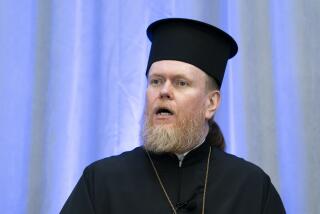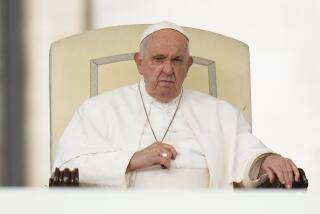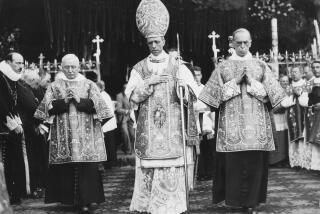Soviets Behind Priest’s Killing, Lawyer Implies
- Share via
WARSAW — A famed Polish lawyer representing the family of Father Jerzy Popieluszko suggested in court Wednesday that a foreign power had instigated the priest’s murder to provoke political unrest and government repression.
The lawyer, Jan Olszewski, did not name the foreign power, but observers in the courtroom said the unmistakable implication of his charge was that the Soviet Union was responsible for the death of Popieluszko, one of the outlawed Solidarity union’s most eloquent and effective champions.
“Someone wanted to poison the home country (Poland) with its own hand,” Olszewski said in his closing arguments in the trial of four secret police officers accused of carrying out the murder last October.
Had the killers succeeded in covering their traces, Olszewski said, the murder might well have set the Solidarity underground and the government against each other in a “spiral of mutual terror,” with each side believing the other was responsible.
“Who could have been behind this provocation? In whose interest could it have been for Poland to become a nation of poverty, despair and terror?” Olszewski asked.
“I believe that no group in Poland could possibly have wished for that,” he declared, adding, “Every schoolchild who is taught history knows who wants a weak Poland.”
Poland was under foreign domination by Austria, Prussia and, most of all, Russia from 1772 to 1918, when it began a brief, 20-year interval of independence. In August, 1939, on the eve of World War II, Nazi Germany and the Soviet Union agreed to divide Poland between them. After seven years of war that annihilated one-sixth of the Polish population, Poland once again fell fully under Moscow’s domination.
“None of the listeners in the courtroom had any doubt what was meant,” said one observer who has attended the trial regularly in the northern city of Torun.
Many Poles, who harbor deep antipathies toward Communists in general and the Soviets in particular, have suspected from the beginning that Moscow’s hand lay behind the murder. The Polish secret police, for which the four officers on trial worked, is thoroughly infiltrated by its Soviet counterpart, the KGB.
Only a month before the murder, the official Soviet press had denounced Father Popieluszko as an “anti-Soviet” subversive who needed to be taught a lesson. The article, in the authoritative government newspaper Izvestia, implicitly criticized Polish authorities for failing to curb his criticism of the Communist regime.
To directly accuse the Soviet Union of any misdeed, let alone political murder, would be an inadmissible breach of the rules in Poland. To have said more than he did, Olszewski would have risked disbarment.
As it was, he neatly reversed suggestions by the government prosecutor on Tuesday that foreign powers had been behind the murder. The prosecutor implied that Western “subversive centers”--a catch-all term for emigre groups, foreign radio stations broadcasting to Poland and intelligence agencies--may have blackmailed the accused organizer of the murder, Capt. Grzegorz Piotrowski, into carrying it out.
For most educated Poles, Olszewski’s reputation as one of the few lawyers willing to defend activists in the political opposition would be enough to make clear the meaning of his charges.
Identifying himself as a “socialist of independence,” not a Communist, Olszewski was a co-founder in the 1970s of KOR, a workers’ rights group. He was a legal adviser to Solidarity and has close ties with the Roman Catholic church, Poland’s principal bastion of non-government thought.
Olszewski and three other attorneys have the legal status of auxiliary prosecutors in the trial, representing the aggrieved parties--the Popieluszko family and Waldemar Chrostowski, the priest’s driver, who escaped the killers to provide crucial evidence leading to their capture.
The government prosecutor called Tuesday for the death sentence for Capt. Piotrowski and the maximum prison term of 25 years for his superior, Col. Adam Pietruszka, 47, and his two accused accomplices, Lt. Leszek Pekala, 32, and Lt. Waldemar Chmielewski, 29.
Olszewski and his fellow lawyers voiced strong objections to the prosecutor’s contention that the priest and his killers represented equivalent forms of “extremism,” suggesting, as Capt. Piotrowski himself did earlier in the 23-day trial, that Father Popieluszko bore responsibility for his own death.
Declaring himself “deeply shocked,” Olszewski said he might have expected such “ugly tricks” by the defendants, but not the government’s own prosecutor.
“There exists no legal basis for equating the responsibility of those who use words with those who use the noose and the club,” he said.
More to Read
Sign up for Essential California
The most important California stories and recommendations in your inbox every morning.
You may occasionally receive promotional content from the Los Angeles Times.













